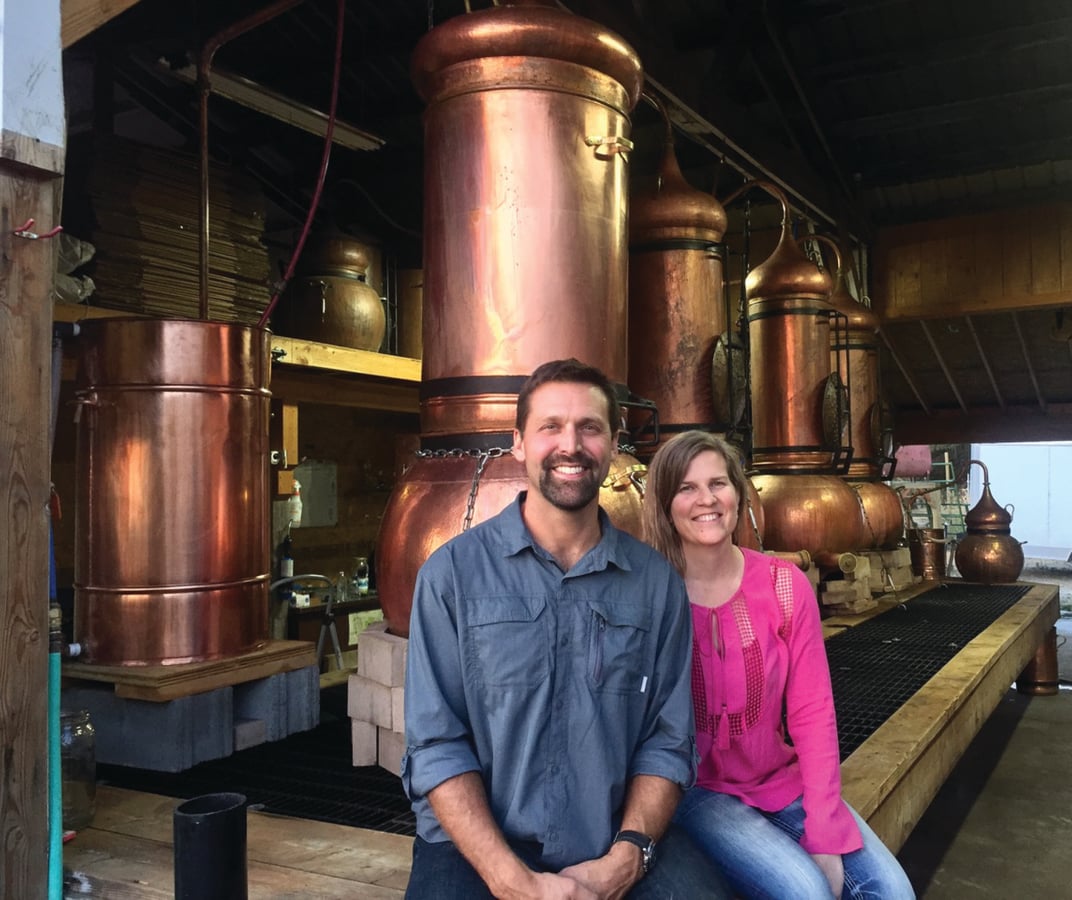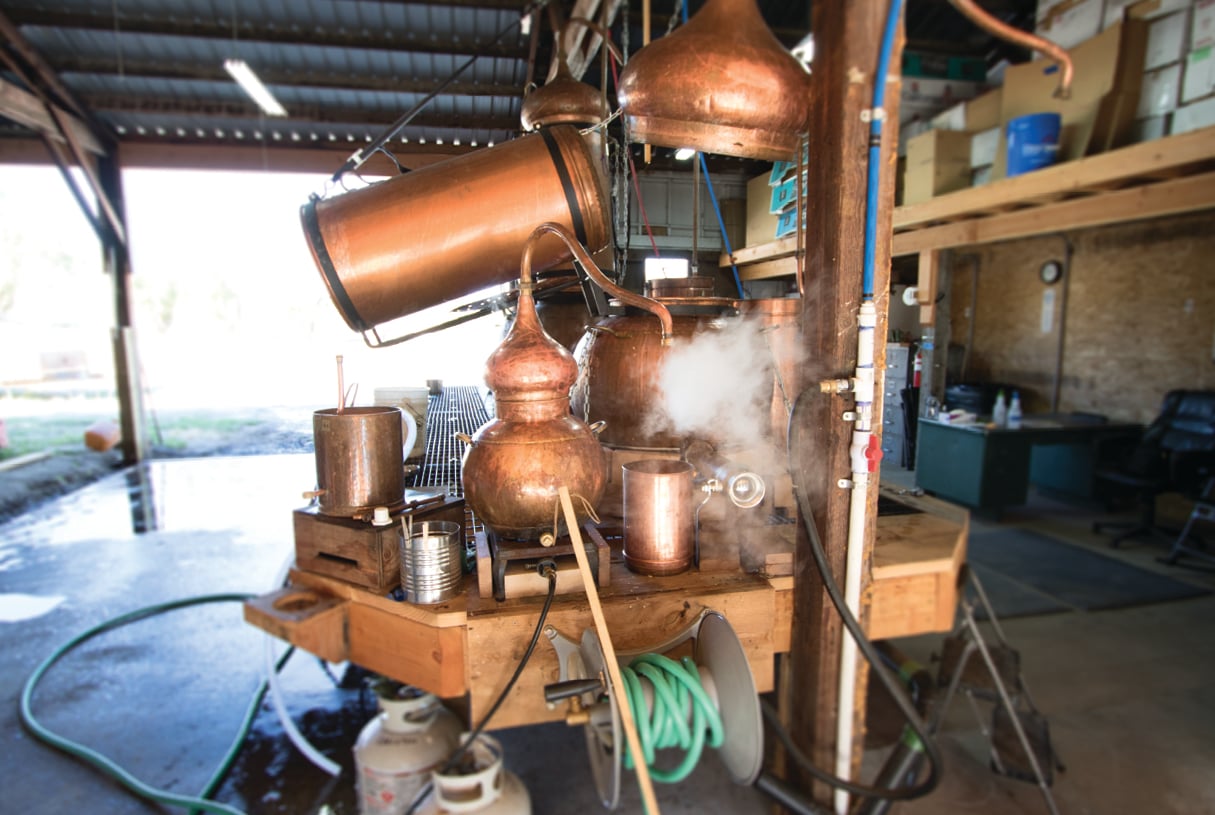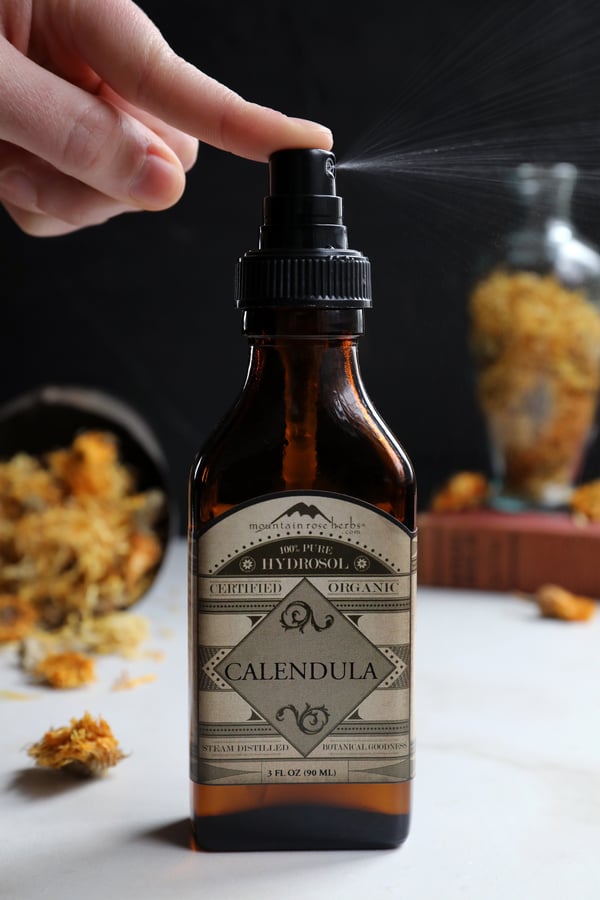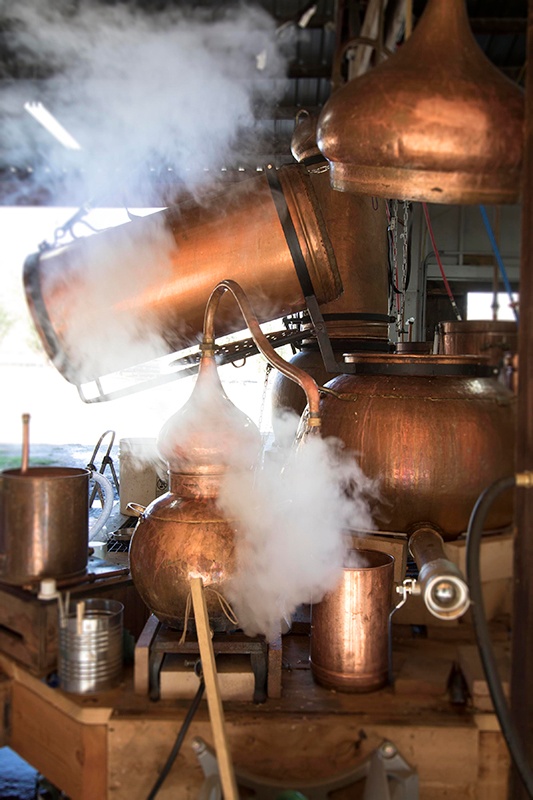Hydrosols are pure botanical extracts produced by distilling fresh leaves, fruits, flowers, and other plant material to create aromatic waters. Although they have similar properties to their essential oil counterparts, they are more delicately scented. These high-quality flower waters are loved for their ease of use and versatility in aromatherapy and body care formulations. Recently, we had the opportunity to speak with the husband-wife team who craft our certified organic hydrosols. During a brief lull in the harvest season, they graciously took a moment to tell us more about how they create these delightfully fragrant waters.
Q & A with Our Organic Hydrosol Distillers
Mountain Rose Herbs (MRH): Can you tell us about your farm?
Hunter*: We live in a very, very rural part of the country, about five miles from the Canadian border (and its incredible mountains). We live on one of the more scenic routes in the Pacific Northwest, right on the Columbia River, which we use to irrigate all our fields. We have a well for our home and stills. Besides growing 35+ aromatic herbs, we have fruit trees and berries and are planting hardwoods and lots of other trees.
MRH: How did you get into this line of work?
Hunter*: My dad was a forester as was his dad before him. Good farming practices have always been important to our family – whether through stewarding the forest or just gardening in the backyard. When I was 12, my parents bought a nursery in NE Washington. I grew up planting and tending all kinds of fruit, nuts, and berries.
Elizabeth*: I was just a city girl who came up to the Pacific Northwest for the summer to visit my parents who had recently moved. I absolutely fell in love with the rural lifestyle and got into gardening and canning. Instead of heading to college, I decided to stay. I got a job at Hunter's parents' nursery here, which is where he and I met. We fell in love, got married, and started our own small farm where we grew trees and organic garlic, and eventually, we also started growing herbs for a distiller. We were fascinated by herbs and the distillation process; fortunately, we were given the opportunity to apprentice within and eventually buy the distilling business from our wonderful friend and mentor.
MRH: How did you transition from the nursery to your current farm home?
Elizabeth: That’s a long story, but the short of it is that Hunter’s parents had previously leased the very land we own now for their nursery. We had outgrown our 3-acre farm and tiny home and were looking for more land, a longer growing season, and water rights. When we saw that this farm was for sale, we knew this was the right place for us. Hunter’s parents now live here and help in so many ways. His dad handles the irrigation and his mom works the fields with the tractor … we can barely get her off the machine at times! The best part is that they are here to help teach our kids to steward our land.
MRH: Why do you cultivate organically?
Hunter: My parents tried to follow organic cultivation practices in their nursery business, even though there weren’t really organic nursery stock listings in the ‘80s and ‘90s. It’s something they’d always done and believed in, and they passed that on to the next generation. We got certified as organic over 10 years ago (in 2005 or 2006), and we were growing things using organic principles prior to that.
We continue to grow organically for multiple reasons. For one, we want to make sure our material is safe and clean for the people who use it, and creating our offerings with organically-grown plants helps us achieve that goal.
The other reason is that, for us, organic is really about soil health and longevity. Do you know your farmer? Are they leaving their fields and their soil in a better state for the next generation, for the children who will be living on that ground? Organic farming is more than just, “we’re not using sprays and chemical fertilizers," it’s a legacy we’re passing onto our children. It’s really important to us that our kids want to be involved. By buying from us, you’re supporting family farms and the next generation of farmers.
MRH: Do you grow all of the materials used in our hydrosol production on your farm?
Elizabeth: About 80 percent of the herbs used in our hydrosols are grown by us or local organic farmers who we know well. But there are a few things that we buy from other organic farmers in other climates so that we can provide a wider variety of hydrosols.
MRH: What sets your hydrosols apart from others found on the market?
Hunter: Other than the fact that they’re organic, three things really set us apart. For one, the plant material we use is fresh, not dried or wilted. We’re very careful with each species and when it’s harvested to ensure we get the proper components and capture the cellular water of the plant too. To make essential oils more affordable, they’re usually distilled with dried plant material; it’s more efficient and economical. The byproduct of that distillation is what you might typically find on the market sold as a “hydrosol.”
As a strictly hydrosol distillery, we use only fresh plant material, which makes for a better end product, since we’re after the “waters” of the plant. Secondly, we use only copper alembic stills from Portugal. Often times, hydrosols are distilled in stainless steel equipment, which can leave a “still note” in the hydrosol. But copper facilitates a certain chemical reaction that not only affects the fragrance, but also adds a preservative effect. Thirdly, we are fanatical about our sanitizing procedures. We do a steam purge of our stills to make sure every single part that touches the hydrosol is clean, and we sterilize everything with organic alcohol. In aromatherapy, we know that small amounts of anything (from unclean instruments to your distilling method) will affect the outcome and show up in the finished hydrosol.
Elizabeth: We know the quality of the botanicals we’re distilling. By carefully harvesting our plants and putting them directly into our own stills, it helps us better control our products. Trying to capture the essence of the plant in the water requires a very well-timed, coordinated dance.
MRH: What are your favorite ways to use hydrosols?
Hunter: I love to use them as a facial toner and aftershave. I’ll even use hydrosols as a body spray when I get out of the shower. We also love them in our electric diffusers and home humidifiers. Since we heat with wood, we often have a pot of water on top of the woodstove into which we add hydrosols. We usually mix a gallon of spring water with a cup of hydrosol and let it go all day long!
MRH: Where did you get those AMAZING stills?
Hunter: They’re from Portugal — handmade copper alembic stills. You know how America is all about cars? Well, in Portugal, they’re kind of all about stills. From what I’ve gathered, if you go to a town in Portugal (we haven’t made it there yet), it’s very noticeable how many towns specialize in still manufacturing. We bought our own stills when we got started, and we’ve gotten really attached to them. It’s kind of like, once you have a still, it’s pretty hard to let it go; they’re like your babies! We even name them. Our first two stills are named Kia (for “new beginnings”) and Jethro (for “abundance”). Then we got Nina (the “dreamer”, since this was our dream property) and Chile (for “completion”). This year, we got a new one named Supercalifragilisticexpialidocious. It’s the biggest, and the kids helped name it.
MRH: When is harvest and distillation season?
Elizabeth: It starts in May. It depends on the plant, but we generally harvest the day before distillation. It’s too much to try to get it done in the morning and distilled that day, so we store the plants and keep them cool and hydrated until the next day. Late November is the end of the season, just as the snow starts falling.
Our exact harvest schedule for each plant revolves around the weather. We live in a climate with a lot of extremes, so that’s always a big struggle for us. We have 35 species that we’re trying to plan for, and managing the timelines is one of our biggest challenges. We have to be flexible and fluid in the summer months, and it’s always a challenge.
MRH: What keeps you going?
Both: Lots of coffee.
MRH: Why do you do what you do?
Elizabeth: We keep doing it because we love it. We really do. It’s very rewarding that we both love it, and it’s something we can do together. It’s really important to us that our kids want to be involved. One of the things we tell people that by buying from us, you’re supporting family farms and future farmers. We try to encourage our kids to take ownership. That’s one of the things that keeps us going.
*Our distillers’ names have been changed to ensure their privacy.
want more of the story?
How Hydrosols Get from Farm to Bottle
You may also be interested in:














